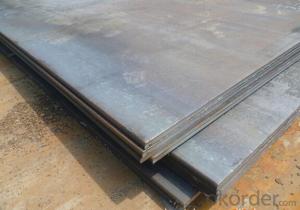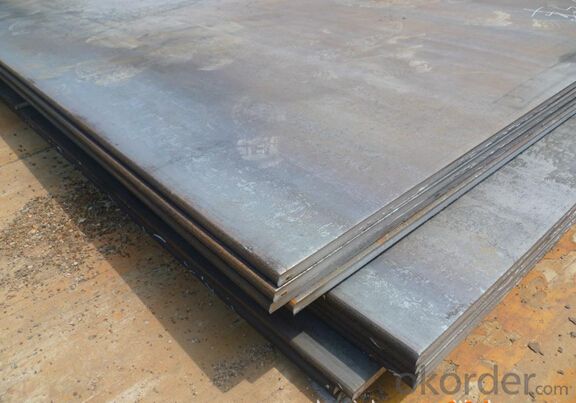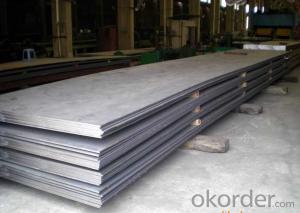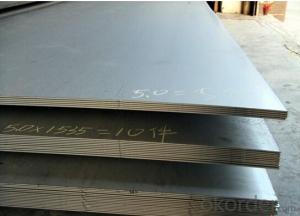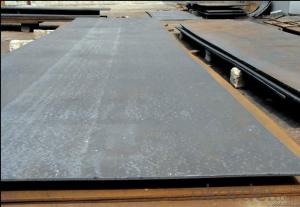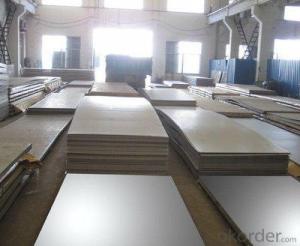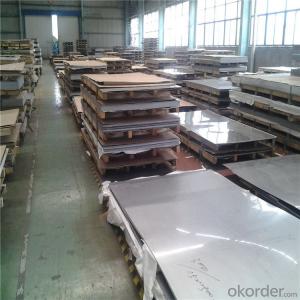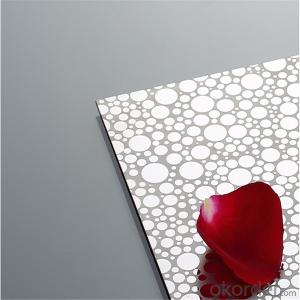A36/A283(A/B/C/D) 2mm 6mm 10mm 30mm Thickness Steel Plate
- Loading Port:
- Tianjin
- Payment Terms:
- TT OR LC
- Min Order Qty:
- 3 m.t.
- Supply Capability:
- 100000 m.t./month
OKorder Service Pledge
OKorder Financial Service
You Might Also Like
Specification
A36/A283(A/B/C/D) 2mm 6mm 10mm 30mm Thickness Steel Plate
Detailed Information of A36/A283(A/B/C/D) 2mm 6mm 10mm 30mm Thickness Steel Plate
| C | Si | P | S | yield Strength MAp | Tensile strength MAp | Elongation % | ||
| A36 | 0.24 | 0.4 | 0.045 | 0.03 | 250 | 400-520 | 26 | |
| C | Si | Mn | P | S | Cu | |||
| A283 | ≤0.27 | 0.15-0.4 | ≤0.9 | ≤0.035 | ≤0.04 | ≥0.2 | ||
| Thickness: | 6mm, 8mm, 12mm, 16mm, 20mm, 25mm, 30mm, 50mm, 80mm, 100mm, 150mm, 200mm | |||||||
| Width: | 1500mm, 1800mm, 2000mm, 2200mm, 2500mm | |||||||
| Length: | 6000mm, 8000m, can cut to width and length | |||||||
| Packing Details; | according to customer‘s require or export’s standard | |||||||
| Delivery time; | 7 days for stock sizes, 20-25 days for new production sizes | |||||||
| Port: | Tianjin China | |||||||
Related Products Overviews of A36/A283(A/B/C/D) 2mm 6mm 10mm 30mm Thickness Steel Plate
Product Name | Typical Grades | Diameter(mm) | Standard Adopted |
Carbon Steel | 20 (1020/S20C/C22) |
Ø16-Ø300 |
GB/SAE/ JIS/DIN |
40 (1040/S40C/C40) | |||
45 (1045/S45C/C45) | |||
Bearing Steel | GCr9 (51100/SUJ1) |
Ø12-Ø250 | |
GCr15 (52100/SUJ2/100Gr6) | |||
GCr9SiMn (A485-Gr.1/SUJ3) | |||
Cr-Mo Steel | 20Cr (5120/SCr420H/20Cr4) |
Ø12-Ø250 | |
40Cr (5140/SCr440/41Cr4) | |||
42CrMo(4140/SCM440/42CrMo4) | |||
Gear Steel | 20CrNiMo |
Ø16-Ø600 | |
20CrMn(5115/SMnC420/20MnCr5) | |||
20CrNiMo(8620/SNCM220/20CrMiMo2) |
Related Products Application of A36/A283(A/B/C/D) 2mm 6mm 10mm 30mm Thickness Steel Plate
Carbon Steel | l Mold bottom l Plastic mold l Construction machinery parts l Automobile parts l Security grills l Screens l Construction |
Bearing Steel | l Aerospace l Navigation l Nuclear energy l Chemical industry l Electronic information l Petrochemical l Instrument and meter l Transportation |
Cr-Mo Steel | l Mechanism & Fasteners gear l Stressed components for vehicles l Engines and machines l Parts of larger cross-section |
Gear Steel | l All kinds of gears l Statically and dynamically stressed component for vehicles l Engines and machine l Larger cross-section parts l Crankshafts |
Company Introduction of A36/A283(A/B/C/D) 2mm 6mm 10mm 30mm Thickness Steel Plate
CNBM International Corporation is the most import and export platform of CNBM group(China National Building Material Group Corporation) ,which is a state-owned enterprise, ranked in 270th of Fortune Global 500 in 2015.
With its advantages, CNBM International are mainly concentrate on Cement, Glass, Iron and Steel, Ceramics industries and devotes herself for supplying high quality series of refractories as well as technical consultancies and logistics solution.
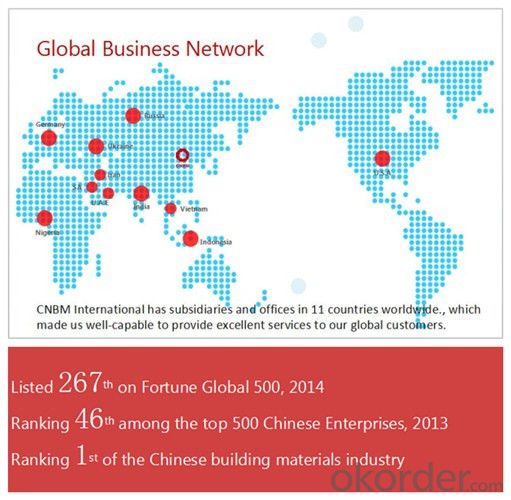
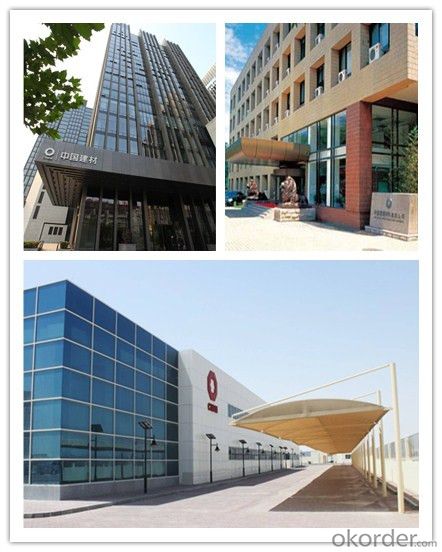
After-sale service | l CNBM provides the services and support you need for every step of our cooperation. We’re the business partners you can trust; you can relax and get on with doing business. l For any problem, please kindly contact us at any your convenient time, we’ll reply you in our first priority within 24 hours
|
Advantages
| l Industry experience over 20 years. l Shipment of goods -More than 70 countries worldwide. l The most convenient transport and prompt delivery. l Competitive price with best service. l High technical production line with top quality products. l High reputation based on best quality products.
|
Packaging & Delivery of A36/A283(A/B/C/D) 2mm 6mm 10mm 30mm Thickness Steel Plate
Packaging Detail | Sea worthy packing /as per customer's packing instruction |
Delivery Detail | 15 ~ 40 days after receiving the deposit |
Products Show
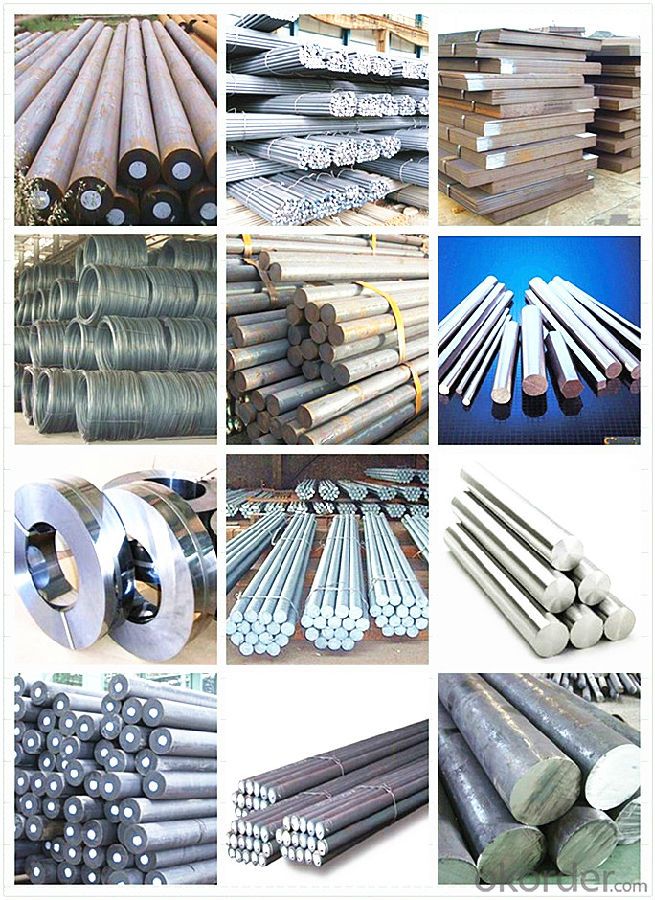
FAQ:
Are you a trading company or manufacturer? | Manufacturer |
What’s the MOQ? | 3 metric ton |
What’s your delivery time? | 15-35 days after downpayment received |
Do you Accept OEM service? | Yes |
what’s your delivery terms? | FOB/CFR/CIF |
What's the Payment Terms? | 30% as deposit,70% before shipment by T/T |
Western Union acceptable for small amount. | |
L/C acceptable for large amount. | |
Scrow ,Paybal,Alipay are also ok | |
Why choose us? | Chose happens because of quality, then price, We can give you both. Additionally, we can also offer professional products inquiry, products knowledge train (for agents), smooth goods delivery, excellent customer solution proposals. |
What's your available port of Shipment? | Main Port, China |
What’s your featured services? | Our service formula: good quality+ good price+ good service=customer's trust
|
Where are your Market? | Covering more than 160 countries in the world |
- Q: How does special steel contribute to the automotive emission reduction?
- Special steel contributes to automotive emission reduction in several ways. Firstly, special steel can be used in the manufacturing of lightweight components, such as body frames and engine parts. These lightweight components help reduce the overall weight of the vehicle, leading to improved fuel efficiency and lower emissions. Additionally, special steel can be utilized in the construction of exhaust systems, which are designed to effectively reduce harmful emissions. Special steel's high strength and corrosion resistance properties make it an ideal material for these components, ensuring their durability and effectiveness in reducing emissions. Overall, the use of special steel in the automotive industry plays a significant role in achieving emission reduction targets and promoting a more sustainable future.
- Q: Can special steel be used for making automotive engine components?
- Automotive engine components can indeed be crafted using special steel. Due to its remarkable strength, durability, and resistance to wear and corrosion, special steel is frequently employed in the manufacturing process. Engine components like crankshafts, connecting rods, camshafts, and valves necessitate materials capable of enduring high temperatures, pressures, and mechanical stresses. Special steel, encompassing high-strength alloy steel or stainless steel, fulfills these requirements and grants the essential performance characteristics for automotive engines. Furthermore, special steel presents the added advantage of reducing weight, thus contributing to improved fuel efficiency and engine performance. All in all, special steel emerges as a fitting material choice for automotive engine components, thanks to its exceptional mechanical properties and capacity to withstand the demanding conditions under which engines operate.
- Q: How does stainless steel contribute to the construction industry?
- Stainless steel contributes to the construction industry by offering durability, strength, and resistance to corrosion, making it an ideal material for various applications such as structural supports, roofing, cladding, and reinforcement. Its versatility, aesthetic appeal, and low maintenance requirements make it a popular choice for architects, engineers, and builders. Additionally, stainless steel's recyclability and sustainability aspects further enhance its contribution to the construction industry.
- Q: What are the different cutting tools used for special steel?
- For special steel applications, there exist various cutting tools commonly employed. These tools are specifically crafted to handle the distinct properties and characteristics of special steel, which often necessitate more precise and specialized cutting techniques. Some of the frequently used cutting tools for special steel include: 1. Saw blades with carbide tips: These blades possess carbide teeth, known for their exceptional hardness and durability. They effortlessly cut through special steel, providing clean and accurate cuts. 2. Cutting tools made of high-speed steel (HSS): HSS cutting tools are manufactured from a type of tool steel that can endure high temperatures while maintaining its hardness. These tools are commonly utilized for drilling, milling, and turning operations on special steel. 3. Cutting tools with diamonds: Diamonds are recognized as one of the hardest materials, making them ideal for cutting through tough materials like special steel. Diamond cutting tools, such as saw blades or grinding wheels coated with diamond, are commonly employed in special steel applications. 4. Machines utilizing waterjet cutting: Waterjet cutting machines utilize a high-pressure stream of water mixed with abrasive particles to cut through special steel. This method is particularly suitable for intricate designs and complex shapes. 5. Machines employing plasma cutting: Plasma cutting machines employ a high-velocity jet of ionized gas to cut through special steel. This method is frequently used for rapidly and efficiently cutting thick sections of special steel. 6. Machines utilizing laser cutting: Laser cutting machines employ a highly focused laser beam to cut through special steel. This method offers high precision and can be utilized for cutting complex shapes and patterns. To ensure the best cutting tool is selected for the job, it is crucial to choose the appropriate cutting tool based on the specific requirements of the special steel in question, as well as the desired cutting method and application. Seeking advice from a specialist or referring to the manufacturer's recommendations can help guarantee the optimal cutting tool is chosen.
- Q: What are the main factors affecting the hardness of special steel?
- The hardness of special steel is influenced by various factors. Let's explore some of the key ones: 1. Carbon content plays a vital role in determining the hardness of steel. The addition of carbon, known as a hardening element, enhances the strength and hardness. Generally, higher carbon content leads to increased hardness. 2. The presence of alloying elements like chromium, manganese, nickel, and tungsten also impacts the hardness of special steel. These elements interact with the steel, forming compounds and solid solutions that enhance hardness and strength. 3. The hardness of steel is significantly affected by the heat treatment process. This involves subjecting the steel to specific heating and cooling cycles. Quenching, a rapid cooling process, transforms the microstructure of the steel, resulting in increased hardness. On the other hand, tempering reduces hardness while improving toughness. 4. The crystal structure of the steel can also influence its hardness. For instance, during quenching, the formation of martensite, a hard and brittle structure, increases hardness. Alternatively, crystal structures like ferrite or pearlite may exhibit lower hardness. 5. The size of grains within the steel's microstructure can impact its hardness. Smaller grain sizes generally lead to higher hardness due to improved strength and limited dislocation movement within the material. 6. Work hardening, which occurs through processes like rolling or forging, can increase the hardness of steel. This phenomenon happens when dislocations in the crystal lattice become trapped and hinder further dislocation movement, resulting in increased hardness. 7. The presence of impurities or non-metallic inclusions in steel can affect its hardness. These impurities can act as stress concentrators, reducing the material's hardness. To achieve the desired hardness for specific applications, it is crucial to consider and carefully control these factors during the manufacturing process of special steel.
- Q: What are the main characteristics of alloy steel?
- The main characteristics of alloy steel include high strength, hardness, and durability due to the presence of different alloying elements such as manganese, nickel, chromium, and molybdenum. It also exhibits good resistance to corrosion, wear, and heat, making it suitable for various applications in industries such as automotive, aerospace, and construction. Additionally, alloy steel offers excellent machinability and weldability, allowing for ease of fabrication and customization.
- Q: How is special steel used in the production of molds and dies?
- Special steel is used in the production of molds and dies due to its exceptional durability, hardness, and resistance to wear and tear. This type of steel can withstand high temperatures and pressures, making it ideal for shaping and forming various materials. By using special steel, molds and dies can be manufactured with precision and reliability, ensuring the production of high-quality and accurate parts.
- Q: How does special steel contribute to the aerospace material cost reduction?
- Special steel contributes to the aerospace material cost reduction by offering enhanced properties such as high strength, lightweight, and corrosion resistance. These qualities allow for the use of thinner and lighter steel components, reducing the overall weight of the aircraft. This, in turn, leads to lower fuel consumption, maintenance costs, and increased payload capacity. Furthermore, the durability and long lifespan of special steel reduce the need for frequent replacements, resulting in cost savings for the aerospace industry.
- Q: What are the common alloying elements in special steel?
- Some common alloying elements in special steel include chromium, nickel, molybdenum, and vanadium. Chromium is often added to improve the steel's corrosion resistance and enhance its hardness. Nickel is used to increase the steel's toughness and resistance to extreme temperatures. Molybdenum is another element that is frequently added to enhance the steel's strength and improve its resistance to wear and corrosion. Vanadium is known for its ability to increase the steel's hardness and strength, making it suitable for applications that require high durability. These alloying elements are carefully selected and added to special steel to achieve specific properties and meet the unique requirements of various industries such as automotive, aerospace, and construction.
- Q: What are the properties of high-temperature stainless steel?
- High-temperature stainless steel possesses excellent corrosion resistance, heat resistance, and oxidation resistance, making it suitable for use in extreme environments with elevated temperatures. It maintains its strength and mechanical properties even at high temperatures, making it ideal for applications such as furnace components, steam generators, and exhaust systems.
Send your message to us
A36/A283(A/B/C/D) 2mm 6mm 10mm 30mm Thickness Steel Plate
- Loading Port:
- Tianjin
- Payment Terms:
- TT OR LC
- Min Order Qty:
- 3 m.t.
- Supply Capability:
- 100000 m.t./month
OKorder Service Pledge
OKorder Financial Service
Similar products
Hot products
Hot Searches
Related keywords
